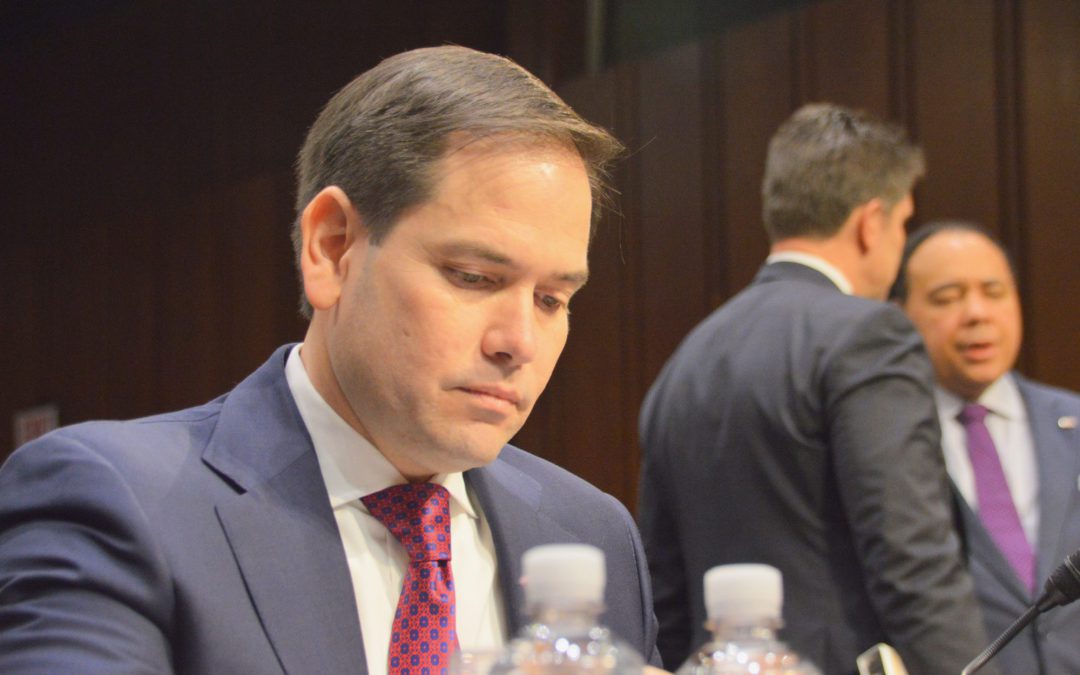WASHINGTON — One month after a shooting at Marjory Stoneman Douglas High School in Parkland left 17 dead and more injured, Florida’s senators presented the Senate Judiciary Committee with opposing solutions for gun violence in school.
Sen. Bill Nelson, a Democrat, spoke in support of universal background checks and an assault rifle ban at a Wednesday Senate Judiciary Committee hearing, adding that assault rifle bullets travel faster and can do more damage.
“There’s a difference between an assault rifle and a handgun,” Nelson said. “You’re not going to stop these massacres unless you get at these two common-sense measures I’ve suggested. Then this may be the last massacre.”
Florida’s junior senator, Republican Marco Rubio, blamed a “multi-systemic failure” of local, state and federal agencies, as well as legal vulnerabilities, for the shooting.
“There are currently insufficient programs in place to report people like the shooter and to coordinate law enforcement, school officials and mental health,” Rubio said.
The hearing coincided with the one-month anniversary of the Parkland shooting. While the hearing was underway, students across the country participated in a series of walkouts held to honor the victims and advocate for gun control legislation and school safety measures.
“The 17 lives in Parkland, Florida are worth a lot more than the weak response we’ve heard from this committee and the president,” said Sen. Dick Durbin, D-Ill., to loud applause from the crowd. “When 97 percent [of Americans] believe we should have universal background checks to keep guns out of the hands of people who misuse them and the students march, we ought to listen.”
Katherine Posada, a language arts teacher at Marjorie Stoneman Douglas High School, spoke at the hearing about huddling in the corner of her classroom with her students, trying not to panic. She said mass shootings are a gun issue and to say otherwise is “absurd.”
“I cannot imagine a scenario in which Nikolas Cruz could have come to my school armed with a different type of weapon, such as a knife, and murdered 17 innocent people,” Posada said.
Ryan Petty, whose 14-year-old daughter Alaina was among those killed last month, called for better school security and early identification programs for potentially violent students. He praised Florida’s government for passing a compromise bill that banned bump stocks, raised the minimum age to buy a gun from 18 to 21 and allowed some teachers to be armed in schools.
“Where we really stop the next killer is in our homes, in our communities, and through our faith,” Petty said. “The best defense against the next Nikolas Cruz is in building up strong families where love can be shown to a hurting child.”
He also alleged that the FBI, the Broward County Sheriff’s Office and the local foster care system knew that Cruz was a threat and did not act. He called Cruz and the danger he posed “the worst-kept secrets in Parkland.”
Officials from the FBI, the Bureau of Alcohol, Tobacco and Firearms and the Secret Service testified about the apparent failures of federal and local law enforcement to prevent the Cruz from opening fire.
“The FBI could have and should have done more. We made mistakes, there is no question about that,” Deputy FBI Director David Bowdich said. “That said, I’m not sure we could have stopped the attack. But it sure would have been nice to try.”
Senators pointed out that the FBI was not able to prevent the shooter from acting, despite information and calls about Cruz, which contained concerns about his mental state and his expressed desire to “shoot up a school.”
He said that the FBI was first tipped off about Cruz in September when someone in Mississippi sent an email to warn that a comment had been posted on YouTube under the name Nikolas Cruz. It read: “I’m going to be a professional school shooter.”
Bowdich said work on the tip was closed two weeks later, when the sender’s identity could not be determined.
Another tip came in January, when a woman who said she was a close friend of Cruz’s family shared with the FBI concerning information from his social media accounts. In the phone call, she warned agents that Cruz had mutilated small animals and wanted to kill people.
After the FBI call operator searched databases, she found the closed lead out of Mississippi, Bowdich said, who added that the matter was closed after she consulted with her supervisor. Bowdich added he did not know why the information was not given to local law enforcement.
Committee chairman Sen. Charles Grassley, R-Iowa, noted that Broward County Sheriff Scott Israel declined an invitation to testify, as did Michael Carroll, secretary of Florida’s Department of Children and Families. Israel had reportedly received upwards of 20 calls about Cruz in the years prior to the shooting.
“By thumbing their noses at Congress, Sheriff Israel and Secretary Carroll have let the American people down and also the citizens of Florida they serve,” Grassley said.


